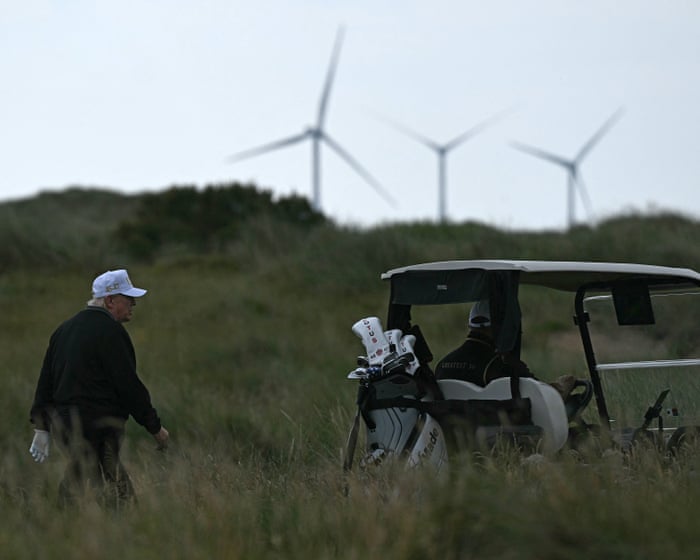Donald Trump’s thinking has often puzzled observers, with his unpredictable views seemingly fueled by personal grievances and anecdotes rather than facts. But on one issue, he has remained unwavering: his dislike for wind turbines—and more recently, renewable energy in general.
This hostility first became public in 2011—four years before he rode down his golden escalator to announce his presidential campaign—when Trump fought unsuccessfully to block offshore wind turbines he called “ugly” from being visible near his Scottish golf course.
Now, in a twist of irony, Trump was back in Scotland this week, once again railing against wind energy. Standing beside a subdued Keir Starmer at his Turnberry golf course, Trump declared, “Wind is a disaster. You’re paying massive subsidies to have these ugly monsters everywhere.”
Starmer, for his part, said the UK supports an energy mix that includes wind power—though he avoided mentioning the urgent need for clean energy to combat the worsening climate crisis. Instead, he focused on energy security, a topic more in line with Trump’s views.
But Trump’s opposition to wind turbines now has global consequences, not just local ones. As president, he banned renewable energy projects on federal lands and signed a spending bill that eliminated tax credits supporting clean energy growth. As a result, new clean energy projects are expected to drop by half over the next decade, costing hundreds of thousands of jobs and billions in lost investment, particularly in rural America.
“It’s expensive, it’s ugly, and we won’t allow it in the United States,” Trump boasted during his meeting with Starmer.
The U.S., as the world’s second-largest carbon emitter, turning its back on renewables has dire implications for the planet. Over the next five years, American utilities shifting to gas and coal will add around 7 billion extra tons of greenhouse gases to the atmosphere—more than double India’s annual emissions.
Despite Trump’s stance, clean energy remains highly attractive. Wind and solar costs have plummeted over the past decade, often making them cheaper than fossil fuels even without subsidies, as the UN recently noted. This year, nearly all new U.S. electricity capacity is set to come from renewables—after all, wind farms are not only cheaper but faster to build than gas plants.
But the climate crisis is a race against time. Even as renewables advance, they must accelerate much faster to prevent worsening disasters. With scientists urging rapid emissions cuts, Trump’s resistance is slamming the brakes at the worst possible moment.
This retreat from renewables also raises geopolitical concerns. China, which Trump often criticizes, is surging ahead in wind and solar development, positioning itself to dominate the clean energy market—a future where Chinese-made wind turbines and electric vehicles could become global standards.
The stakes couldn’t be higher. While Trump digs in against renewables, the world is moving forward—leaving the U.S. at risk of falling behind in both climate action and economic opportunity.The U.S. is taking a very different approach: betting that the world will keep relying on fossil fuels, as it has for over a century, and will turn to America’s abundant oil and gas reserves. “This is the most pro-fossil fuel administration in modern history,” one environmental group remarked recently, as President Trump moved to dismiss scientific evidence that greenhouse gases endanger public health and began rolling back pollution limits for vehicles and oil and gas operations.
The path the world takes will not only determine our climate future but could also redefine the global standing of the two superpowers in the coming decades. “This is a turning point in the global climate story—it will dramatically shift the positions of these two major powers,” said Li Shuo, an expert on China’s climate policies. “The U.S. has missed its last chance to join the green energy movement.”
Related reading:
– Fact-checking Trump’s claims about wind turbines
– How Trump’s policies are undermining geothermal energy
– Experts warn that rejecting climate science ignores overwhelming evidence
This is an excerpt from the Down to Earth climate newsletter. For the full version, delivered weekly, subscribe here.



